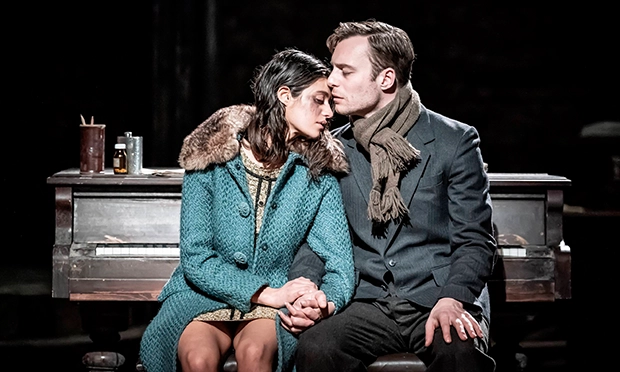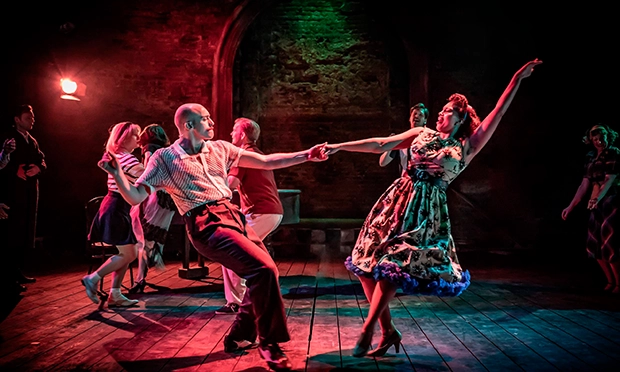Cold War, Almeida Theatre, stage review: ‘A thinking person’s musical’

Anya Chalotra and Luke Thallon in Cold War. Photograph: Marc Brenner
Flippantly christened “a Soviet-peasant Fame” (by me), Paweł Pawlikowski’s Oscar-nominated 2018 film, Cold War, has now been musicalised.
And you can add in a sprinkle of Elvis Costello and a sparkle of Conor McPherson because, after all, it is Christmas.
Luminous telly stars and Polish folk music combine for an evening that glows, in a smoky sort of way.
Star-crossed lovers, our Eastern Bloc Shakespearean tale, the Antony and Cleopatra of 1940s Poland.
Composer Wiktor (Luke Thallon) meets fake peasant Zula (played by The Witcher star Anya Chalotra) on a tour of occupied Poland, and they begin crafting a show of traditional folk song and dance.
See my earlier reference to Fame, just with fewer leg warmers and more sickles.
A raffish Elliot Levey as Kaczmarek smells the coffee when asked to work more Communist propaganda into the show by the Moscow brass, becoming the head honcho of the group.
The rest of the story is our unlucky leads, missing, misunderstanding, crossing borders at the wrong time, clashing, and crashing into each other with predictably happy results (enter sarcastic eye roll here).
For such a simple tragedy, it’s style, my darling, that saves it from smudginess.
McPherson’s adaptation has buckets of it, and this is a musical don’t you know.
Chalotra’s high tones, flighty like a passing storm yet with masterful control, are one such injection of the good stuff.
Clad in the changing fashions of the era, worn down by her unsuitable love, this is a glorious ascendancy for the actress.

The play features folk songs and dances. Photograph: Marc Brenner
Thallon and Levey both excel with their opposing flavours of masculinity.
Thallon is doomed, regretful, and stunted as the composer and defector who can’t compose or effectively defect.
When he sings, it’s so natural, like someone singing to themselves very beautifully.
Levey brings us all the wheeler-dealer brash of the East End market stall, but avoids a lot of the musical heavy lifting.
I was about to say this isn’t a “musical” musical, but thinking about it, it has many of the best parts: big swelling dance numbers, created by the spirited chorus, and plenty of heart-picking, compact harmonies.
Especially eye-watering is Alex Young’s bar scene that reworks Costello’s Silent Child.
What I mean is this is very much a play with music. People sing in the background or on stage, dodging the I-feel-a-song-coming-on corniness of a more classic West End production.
The only downside is that the beauty of Costello’s songwriting and Simon Hales’s arrangements, including the miraculous collaboration with Warsaw Village Band, are often cut short by pesky dialogue.
Hackney’s own Ellen Kane brings us choreography that keeps everything swinging along, working the folk dance of the play’s beginning with the jazzy swish of 1950s Paris.
Evie Gurney’s perfect period costumes again tug us through the Iron Curtain as the setting swaps from East to West and back again.
Jo Bausor’s peeling theatre-within-a-theatre set charms this critic’s worn soul immensely. The only slight flaw is that the sections in rural Poland are more effective than Paris’s famous artistic scene, because the Wilton Music Hall-esque proscenium looks too expansive for the basement bars and cabaret clubs.
This is a thinking person’s musical, if you will, and director Rupert Goold has another accolade to add to his presumably heaving shelves.
It’s chic and obviously a bit miserable, but there’s nothing like good theatre to lift you up, only to dash you back on to the rocks again.
The vigorous acapella folk tunes meld beautifully with Costello’s piano-accompanied wordsmithing, and a sense of loss and failure warbles through the space. They say the course of love never did run smooth.
But if Wiktor and Zula were a river, they would be the proud Volga: dammed and diverted by an unfeeling fatherland, impinged at every turn, a casualty of politics and personality.
Cold War runs until 27 January 2024 at the Almeida Theatre.
